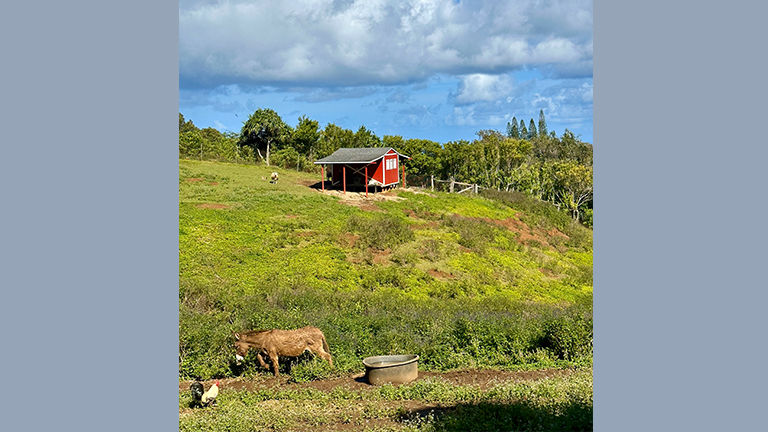Every animal at Leilani Farm Sanctuary in Haiku, Maui, has a name. During my visit, I was wearing a pair of borrowed work gloves, stripping red ti leaves from a stalk to feed the animals on the upcoming farm tour, when a fluffy, long-haired tabby cat named Jakey jumped up onto the table of the shed I was working in, wanting attention. Clearly, it was time for a pet break.
The nonprofit sanctuary — situated on 8 hilltop acres on Maui’s windward coast, a few miles from Paia — was started by animal lover Laurelee Blanchard decades ago as a refuge for neglected, homeless or abused animals to live their lives out in peace. It’s one of the spots on Maui that’s part of the Hawaii Tourism Authority’s Malama Hawaii Program, which aims to connect visitors with volunteer opportunities during their visit.
Volunteering at Leilani Farm Sanctuary
I had pre-booked my slot at the farm sanctuary on a sunny morning to spend a few hours picking fruit and cleaning plants to feed the animals, as well as cutting back shell ginger plants to encourage new growth. If I was working too hard or too fast, the coordinator encouraged me to “go sit with the cats in their barn” or “go feed the deer.” The deer, named Lani and Veronica, were both orphaned after hunters killed their mothers. Today, they have a large pen near Laurelee’s cottage in the middle of the property, and they were big fans of the red ti leaves I had spent the morning cleaning.
But it was Gregory, one of two resident turkeys, who provided me with a lasting souvenir. After I returned to the shed to strip some more red ti leaves, he pecked at my thigh and took a chunk out of it. The staff were quick with a Band-Aid, but Gregory wouldn’t relent, chasing me into the cat barn to wait him out behind the screen door. I felt rather silly, fleeing a turkey with murder in his eyes, but a friend who had visited the sanctuary before later explained to me: “He doesn’t like men. We think he must have been traumatized by men before he came to the sanctuary.”
 A variety of rescued animals call Leilani Farm Sanctuary home.
A variety of rescued animals call Leilani Farm Sanctuary home.
Credit: 2024 Scott LairdGregory had previously lived in a cage, waiting for slaughter, so that tracked. He wandered off after a few minutes, and I was free to resume hunting for papayas. I met several other animals that morning, including Lehua the donkey, who snacked on the papaya I picked; Charlotte, a pig with a broken leg and a sweet disposition; and numerous other chickens, geese, ducks, cats, goats and guinea pigs.
The sanctuary also offers tours for those shorter on time, and animal lovers can even sponsor a new friend they meet on their tour, if they feel so inclined. (Volunteers help with cleaning, maintenance and other light tasks, but the animals also need to be fed on more than just harvested ti leaves.)
Kipuka Olowalu and More Volunteer Opportunities
On West Maui, Kipuka Olowalu is another nonprofit that offers visitors the chance to get their hands dirty. Located in the Olowalu ahupuaa, or land division, the space is nestled between two valley ridges just past a scattering of ancient petroglyphs carved into a rock face. Here, a group of dedicated locals tend native plants using traditional land-management practices, hoping to ultimately free the land of invasive, non-native species and return the area to its state before European contact.
My experience began with learning traditional Hawaiian protocols before finding out more about how native Hawaiians have traditionally managed their ahupuaa with practices that draw on a deep understanding of the natural flow of resources and interconnectedness of the land’s flora and fauna. We received in-depth explanations of all the plant life on the parcel — in particular, the taro plants grown in beds of trickling fresh water from the mountains. We closed out our time by planting native seeds, which will be transplanted to the ground once they start growing.
The Maui Visitors & Convention Bureau and Hawaii Tourism Authority encourage visitors to donate time or money during their visit in support of the Maui communities affected by last year’s wildfires. Travel advisors can help with that messaging, allowing clients to take an active, fulfilling role in dedicating a small part of their Maui vacation to helping leave the destination a little better than they found it.